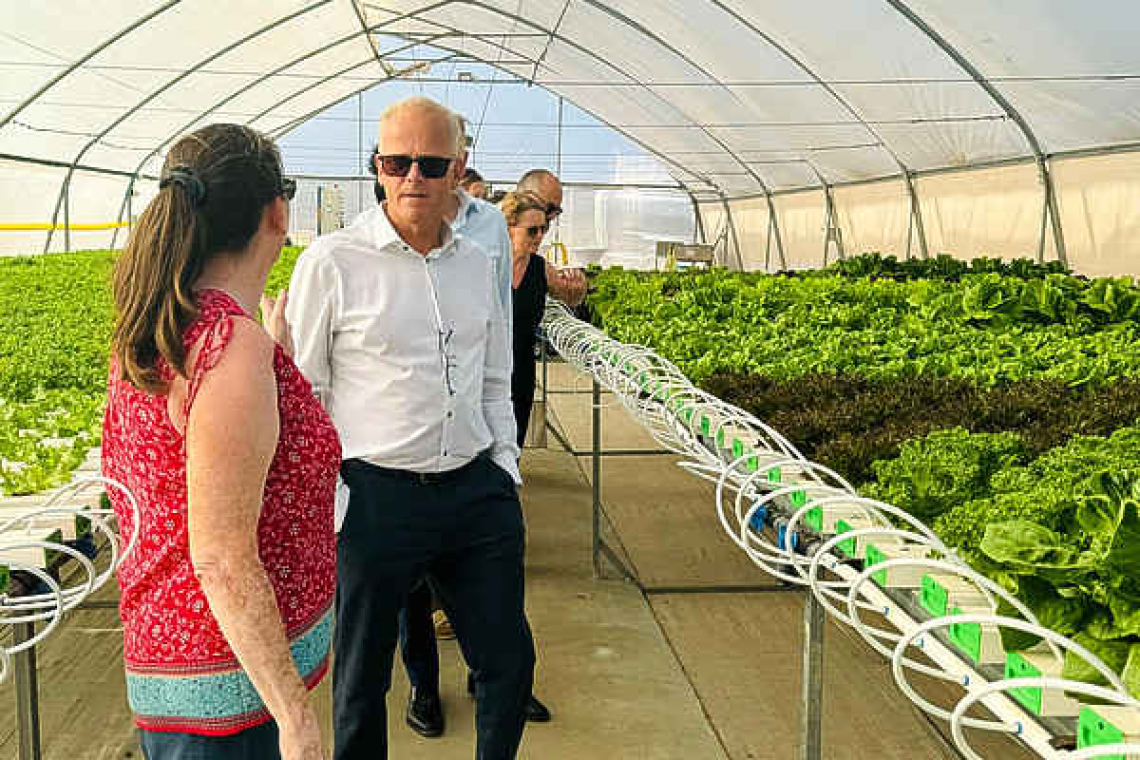Dutch State Secretary Ferenc Zsolt Szabó at a greenery in Aruba
THE HAGUE--The Dutch government is launching a new strategy to increase economic self-reliance in Bonaire, St. Eustatius and Saba (the BES islands).and for Curacao, Aruba and St. Maarten by giving the private sector a more prominent role in local development. The first step in this approach will use a 24-million-euro fund aimed at enhancing local fresh food production.
The initiative combines financial resources from the Dutch government with investments from local private institutions, including banks and pension funds, through the creation of a revolving fund. This fund is expected to improve food security, stimulate entrepreneurship, and reduce the islands’ dependence on expensive imports.
State Secretary for Digitalisation and Kingdom Relations Ferenc Zsolt Szabó announced the plan in a letter to the Dutch Parliament, describing it as a “game changer” for the islands.
“We need better results than what we’ve seen so far,” said Zsolt Szabó. “We’re going to do things differently from now on, as far as I’m concerned. By directly involving private parties, we create more room for entrepreneurs to invest. This stimulates the economy and directly contributes to economic self-reliance, which I consider essential for the future of the islands – alongside good governance and sound finances.”
Zsolt Szabó emphasised that this model – one that brings together government, the private sector, civil society, and local authorities – could also be applied in other sectors. “This is a real ‘game changer’ for the islands,” he said. “My ambition is for this to become a catalyst for future investments in the islands.”
The 24-million-euro allocation for food security was announced earlier by the Dutch cabinet in response to the Caribbean islands’ high dependence on imported fresh food. Importing food is not only expensive for residents, but also leaves the islands exposed to external risks, including fluctuating exchange rates, high tariffs, and natural disasters.
Producing food locally would reduce expenses, foster innovation, strengthen the economy and improve resilience. “Entrepreneurs play a vital role here,” Zsolt Szabó said. “They drive innovation and launch the kind of local initiatives that make a difference. What we are offering is not another isolated project, but a well-thought-out, results-driven strategy.”
To further support innovation, knowledge institutions will be involved in the programme and a new academy is being developed to help entrepreneurs apply and spread practical knowledge.
A major hurdle for local entrepreneurs – especially in the agriculture and food sectors – is access to capital. It remains difficult for small businesses to secure funding to start up, expand, or innovate. To address this, the government will set up a revolving loan fund housed in an independent foundation. In addition to public money, private partners like banks and pension funds will be invited to invest. The fund will offer low-interest loans to businesses engaged in fresh food production.
This structure ensures the long-term effective use of the funds and stimulates both private sector development and innovation. In the second half of 2025, businesses will also be able to apply for 5,000 euros worth of knowledge vouchers, which can be used to obtain expert advice from academic or technical institutions – for example, on improving productivity or efficiency.
Part of the budget will be directed to local governments to help create the necessary infrastructure and conditions for improving food security. This could include investments in irrigation systems, storage facilities and transportation infrastructure.
Over the coming months, the government will finalise the detailed implementation plan and determine how funds will be distributed across the six Caribbean islands: Aruba, Curaçao, St. Maarten, Bonaire, Saba and St. Eustatius.
The goal is to have the foundation and application offices operational by early 2026, setting the stage for a new era of targeted, sustainable development led by Caribbean stakeholders and supported by meaningful partnerships within the Kingdom.







